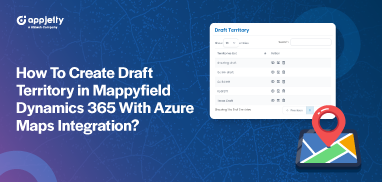Introduction
Technology plays a huge role in shaping transactions, property evaluation, and market analysis. One such technology that has gained immense traction and transformed the industry is Dynamics 365 Map.
Let us focus on the intricate details of how Dynamics 365 Map is reshaping the real estate sector. We will share comprehensive insights into property locations to streamline decision-making processes for investors, developers, and agents.
Overview of Dynamics 365 Map
Dynamics 365 Map is a powerful tool that provides the means to visualize the data and analyze, interpret, and understand it in full on a map.
The main characteristic of Dynamics 365 Map is data plotting. Different kinds of information like property boundaries, zoning regulations, demographic characteristics, infrastructure networks, etc. can be visualized.
The multiple data layers in one map ensure that the user has a comprehensive information space in relation to the relationship of the different elements, thereby facilitating better decision-making processes.
Importance of Dynamics 365 Map in Real Estate
Dynamics 365 Map holds immense significance in real estate industry. Here are some key ways in which it is revolutionizing the sector:
Site Selection and Property Evaluation
Dynamics 365 Map empowers real estate experts to pinpoint the perfect locations for development or investment projects by leveraging advanced analytics on proximity to key amenities, transportation infrastructure, demographic shifts, and prevailing market demands.
This innovative tool simplifies the process of selecting sites, ensuring that real estate investments are strategically placed in locales poised for significant growth and returns. With Dynamics 365 Map, making informed decisions about where to invest becomes clearer, leading to enhanced potential for success in the competitive real estate market.
Market Analysis and Property Valuation
Spatial data analysis is one tool that allows professionals to use that pool of information to conduct comprehensive market analyses and more accurately determine property values.
Dynamics 365 Map facilitates visualization of market trends, identifying emerging hotspots, and comparing property prices across various neighborhoods or regions. This information is invaluable for pricing properties competitively and making informed investment decisions.
Risk Assessment and Due Diligence
Dynamics 365 Map helps you evaluate risks and clearly brings out the environmental hazards, regulatory constraints, and land use restrictions. All the prospective risks that would have been under the property or location could easily be identified by the real estate developers and investors in the best possible way.
Portfolio Management and Asset Tracking
Real estate mapping software equips real estate portfolio and asset managers with a toolset that belongs to them to handle portfolio visualization, asset tracking, and performance analysis.
It traces performance at the property level, records the rates of occupancy, and looks at opportunities for optimization or diversification of its portfolio wherever it is necessary.
Customer Engagement and Marketing
Dynamics 365 Map can also enhance customer engagement and marketing efforts in the real estate industry. Real estate agents and brokers may use this to put up interactive maps of offered properties, pointing out amenities in the neighborhood, nearby schools, and other points of interest to lure potential buyers or tenants. Together with the immersive customer experience, the technology enables company clients to envision the property within the spatial context. This allows very clear and informed decision-making.
Exploring the Features of Dynamics 365 Map
Dynamics 365 Map comes with a diverse array of features and functionalities designed to cater to the specific needs of the real estate industry. Some of the key features include:
Spatial Analysis Tools
Dynamics 365 Map offers a wide range of spatial analysis tools, such as buffering, overlay analysis, proximity analysis, and spatial interpolation.
These tools allow users to analyze spatial relationships, identify patterns, and derive meaningful insights from spatial data.
Customizable Maps
Users can create highly customizable maps tailored to their requirements, incorporating various data layers, symbology, labels, and annotations.
This flexibility enables real estate professionals to visualize spatial data in a way that best suits their analysis or presentation needs.
Data Integration and Interoperability
Dynamics 365 Map supports integration with various data sources and formats, including GIS data, CAD files, aerial imagery, and satellite data.
This allows users to seamlessly leverage existing data assets and incorporate external data sources into their analyses.
Geocoding and Address Matching
Dynamics 365 Map provides geocoding and address-matching capabilities, allowing users to convert addresses or place names into geographic coordinates and vice versa.
This functionality is handy for geocoding property listings, conducting spatial queries, and generating location-based reports.
Mobile and Cloud-Based Solutions
Many real estate mapping software providers offer mobile and cloud-based solutions, enabling users to access spatial data and perform analyses on-the-go.
This mobility ensures that real estate professionals can make informed decisions anytime, anywhere, using their mobile devices or web browsers.
Collaboration and Sharing
Dynamics 365 Map facilitates collaboration and sharing of spatial data and analyses among team members or stakeholders.
Users can collaborate in real time, share maps and analyses via web links or embed codes, and control access permissions to ensure data security and privacy.
How Dynamics 365 Map Can Change the Future of Real Estate Industry
Integrating Dynamics 365 Map into the real estate industry is poised to bring about transformative changes and unlock new opportunities for growth and innovation.
Here are some ways in which Dynamics 365 Map can change the future of the real estate industry:
Data-Driven Decision Making
Property mapping software empowers real estate professionals to make data-driven decisions based on comprehensive spatial analyses and insights.
By leveraging spatial data, market trends, and predictive analytics, they can identify opportunities, mitigate risks, and optimize investment strategies for maximum returns.
Enhanced Customer Experience
Dynamics 365 Map enhances the customer experience by providing clients with interactive maps, virtual property tours, and personalized location-based recommendations.
This immersive experience helps clients make informed decisions and fosters greater trust and satisfaction with real estate professionals.
Sustainable Urban Development
The Dynamics 365 Map can also be used in the strategies of smart growth, which includes efficient planning of land use and sustainability on both the built and natural environment toward urban development.
The spatial data will, therefore, present an opportunity for real estate developers and urban planners to optimize infrastructure development, reduction of carbon emissions, and create resilience and livability of communities.
Disruption of Traditional Models
Dynamics 365 Map brings great change to the traditional models of real estate transactions and property management. In fact, on many of the online platforms and marketplaces, geo-mapping technology is democratizing access to real estate information and even allowing peer-to-peer transactions, something which used to be a stronghold of traditional brokerage firms.
Emergence of Proptech Innovations
This has led to the emergence of modern solutions that combine property mapping software with other technologies, such as artificial intelligence, machine learning, and blockchain.
Automated property valuation algorithms or decentralized property registries: The innovations hereby have the potential to revolutionize the way transactions of real estate assets, including management and ways of monetizing those assets, are taking place.
Globalization and Market Expansion
Dynamics 365 Map opens up international markets by giving access to spatial data and market intelligence across the world. Now search and analyze cross-border investment opportunities, international property listings, and global market trends with ease, opening new avenues for diversification and growth.
Conclusion
Dynamics 365 Map has become a game-changer in the real estate industry, hosting spatial abilities for unbeatable spatial analysis, market intelligence, and research-based decision-making. Data vision, risk assessment, and customer engagement—this reshaping is the whole process of evaluation of properties, transactions, and markets. Integrating Dynamics 365 Map means a revolution in a dynamic but still extremely inefficient and opaque world like the real estate field, which will open new doors to the sector for growth, innovation, and sustainability.
All product and company names are trademarks™, registered® or copyright© trademarks of their respective holders. Use of them does not imply any affiliation with or endorsement by them.





